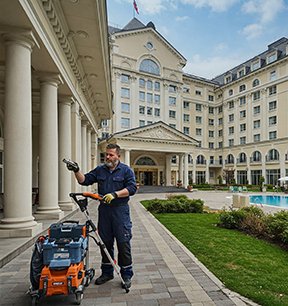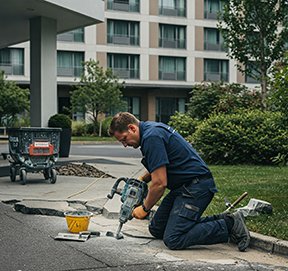Published: January 11, 2017 | Updated: September 30, 2025
Published: January 11, 2017 | Updated: September 30, 2025
Beyond Bookings: Resolving Hospitality Hurdles with CMMS
 In today's hospitality industry, marked by the growing influence of platforms like Airbnb, hotels and resorts face heightened pressure to deliver exceptional guest experiences. To thrive in this competitive environment, these establishments must adopt innovative strategies that not only attract but also retain guests. A Computerized Maintenance Management System (CMMS) emerges as a powerful tool, directly tackling several key challenges and paving the way for increased guest satisfaction and improved operational performance.
In today's hospitality industry, marked by the growing influence of platforms like Airbnb, hotels and resorts face heightened pressure to deliver exceptional guest experiences. To thrive in this competitive environment, these establishments must adopt innovative strategies that not only attract but also retain guests. A Computerized Maintenance Management System (CMMS) emerges as a powerful tool, directly tackling several key challenges and paving the way for increased guest satisfaction and improved operational performance.
Enhancing the Guest Journey Through Proactive Maintenance
The modern traveler expects positive and beneficial experiences. A malfunctioning air conditioning unit in the height of summer or an elevator out of service creates significant frustration and negatively impacts a guest's stay. These disruptions can lead to negative reviews and damage a hotel's reputation, directly affecting future bookings. A CMMS addresses this challenge head-on by facilitating the scheduling and execution of preventive maintenance tasks.
Instead of reacting to breakdowns, hotel staff can proactively inspect and service critical equipment like HVAC systems, plumbing, and electrical infrastructure. This approach minimizes unexpected downtime, ensures that facilities operate smoothly, and contributes directly to a positive and comfortable guest experience. Imagine a guest arriving at their room to find it perfectly climate-controlled–this level of comfort and reliability fosters satisfaction and encourages repeat visits.
In addition, a CMMS allows for detailed tracking of maintenance history for each piece of equipment. This historical data proves invaluable in identifying recurring issues and predicting potential failures. By analyzing these trends, maintenance teams can implement more effective long-term maintenance strategies, further reducing the likelihood of disruptive breakdowns. This moves maintenance beyond simple fixes to a strategic function that actively contributes to guest comfort and operational stability.
Consider the scenario where a hotel consistently experiences issues with a particular type of door lock. The CMMS data highlights this pattern of recurring issues, prompting a decision to invest in more durable locks.
Beyond essential systems, a CMMS extends its benefits to the aesthetic aspects of a hotel. Scheduled maintenance of landscaping, pools, and other guest amenities ensures that the entire property maintains a high standard of appearance. First impressions matter, and well-maintained grounds create a welcoming and appealing environment for arriving guests. A CMMS can trigger regular tasks like sprinkler system checks, lawn care, and pool cleaning, ensuring these elements consistently meet guest expectations. This attention to detail demonstrates a commitment to quality and enhances the overall guest experience, contributing to positive perceptions and increased bookings.
Boosting Profitability Through Smart Maintenance Practices
In the hospitality industry, unplanned equipment failures translate directly into lost revenue. When a critical system goes offline, rooms become unusable, and guest satisfaction plummets, potentially leading to refunds or cancellations. A CMMS directly tackles this drain on profitability by enabling proactive/preventive maintenance schedules. By identifying and addressing potential issues before they escalate into major breakdowns, hotels significantly reduce downtime. This ensures that rooms and facilities remain operational, maximizing occupancy rates and revenue generation.
Think of a commercial laundry system in a large hotel; if it breaks down unexpectedly, it can severely impact the availability of clean linens, potentially leading to guest dissatisfaction and operational bottlenecks. Scheduled maintenance, managed through a CMMS, minimizes the risk of such disruptions.
Moreover, preventive maintenance extends the lifespan of equipment. Regular servicing and timely minor repairs prevent small issues from developing into costly replacements. This represents a significant saving for hotels over the long term. Instead of facing large capital expenditures for premature equipment replacement, resources can be allocated to other areas that enhance the guest experience.
For example, regular filter changes and coil cleaning on HVAC units not only ensure efficient operation but also prolong the life of the entire system, delaying the need for expensive replacements. The CMMS acts as a central system for tracking maintenance schedules and ensuring these vital tasks are completed on time.
A well-implemented CMMS can lead to more efficient resource allocation. By accurately tracking maintenance needs and scheduling tasks effectively, hotels can better manage their maintenance staff and inventory of spare parts. This reduces the need for emergency repairs, which often involve premium costs for parts and labor.
Discover how streamlined maintenance processes can elevate production. Learn more.
Human Resources Management: Informed Scheduling and Efficiency
Effective management of human resources is crucial for smooth hotel operations. A CMMS, particularly those with HR tracking modules, provides valuable insights into the workload of maintenance teams. Managers gain a clear view of scheduled work orders per shift, crew, or individual technician. This visibility allows for informed scheduling decisions, ensuring adequate staffing levels to handle the workload without overburdening employees or leaving critical tasks unattended.
Imagine a scenario where a sudden influx of maintenance requests occurs. With a CMMS, a manager can quickly assess the current workload of each team and allocate resources efficiently to address the issues promptly, maintaining service levels without causing undue stress on the existing staff.
Moreover, the data collected by the CMMS can aid in performance evaluation and identification of training needs. By tracking the time taken to complete specific tasks and the types of issues encountered, managers can identify areas where individual technicians or teams might benefit from additional training or support. This continuous improvement cycle enhances the skills and efficiency of the maintenance staff, ultimately leading to faster response times and higher quality work. The CMMS, in this context, becomes a valuable tool for developing a skilled and efficient maintenance workforce.
Seamless Purchasing: Ensuring Operational Continuity
Running out of essential spare parts can lead to significant downtime and disrupt hotel operations. A CMMS with purchasing integration or inventory management modules addresses this critical challenge. These systems allow hotels to organize their inventory of maintenance supplies, set minimum and maximum stock levels for each item, and automate the reordering process when levels fall below the specified threshold. This automated system ensures that necessary parts are always available when needed, minimizing delays in repairs and preventing prolonged equipment downtime.
Picture a scenario where a vital component for a boiler system is needed on a weekend; without an automated purchasing system triggered by low inventory levels within the CMMS, the hotel could face significant heating issues and guest discomfort.
The integration with purchasing programs further streamlines the procurement process. When the CMMS detects a low stock level, it automatically generates a purchase request and sends it to the designated personnel for approval. This eliminates the need for manual tracking and ordering, reducing the risk of human error and ensuring timely replenishment of supplies. This efficiency not only saves time but also helps in negotiating better prices with suppliers by providing accurate data on purchasing patterns. The CMMS acts as a central hub for managing both maintenance needs and the associated procurement processes.
This inventory management also contributes to cost savings by preventing overstocking of parts that may become obsolete or are rarely used. The CMMS provides data-driven insights into part usage, allowing hotels to optimize their inventory levels and reduce carrying costs. By maintaining the right amount of essential supplies, hotels can ensure operational continuity without tying up excessive capital in unnecessary inventory. This smart approach to purchasing and inventory management, facilitated by the CMMS, is vital for maintaining efficient and cost-effective hotel operations.
 Facility Maintenance: Beyond the Guest Room
Facility Maintenance: Beyond the Guest Room
The overall appearance and functionality of a hotel extend beyond the individual guest rooms. Well-maintained grounds, safe walkways, and functional public areas contribute significantly to the guest experience. A CMMS facilitates the management of these broader facility maintenance tasks. It allows for the scheduling of routine maintenance activities such as landscaping, pool maintenance, and the upkeep of common areas. This ensures that the entire property remains in excellent condition, creating a positive and welcoming atmosphere for guests. Consider a guest arriving and noticing meticulously manicured gardens and a sparkling clean pool–these details contribute to a favorable first impression and enhance their overall perception of the hotel.
A CMMS enables efficient handling of reactive maintenance requests for facility-related issues. Guests can easily report problems such as a broken sidewalk, a malfunctioning elevator button, or a leaky faucet in a public restroom. The CMMS allows staff to log these requests, assign them to the appropriate maintenance personnel, track their progress, and ensure timely resolution. This responsiveness demonstrates a commitment to guest safety and comfort. A hotel that promptly addresses such issues fosters trust and encourages guests to return. The CMMS acts as a central communication and management tool for all facility maintenance needs, both proactive and reactive.
By effectively managing both routine and reactive facility maintenance, a CMMS helps hotels create a safe, attractive, and functional environment for their guests. This comprehensive approach to maintenance contributes directly to guest satisfaction and reinforces the hotel's commitment to quality in all aspects of its operations. A well-maintained facility speaks volumes about a hotel's attention to detail and its dedication to providing a positive guest experience, ultimately contributing to its long-term success in a competitive market.
The integration of a CMMS represents a strategic move for hotels aiming to not only survive but excel in a demanding industry. By addressing fundamental operational challenges related to maintenance, resource allocation, and guest experience, these systems lay a solid foundation for sustained success and guest loyalty.
FAQs
What is a CMMS and how does it benefit hotels?
A CMMS helps hotels streamline maintenance tasks, reduce downtime, and improve guest satisfaction by ensuring facilities run smoothly.
How does MAPCON’s CMMS improve guest experiences?
MAPCON’s CMMS allows hotels to proactively schedule and track maintenance, preventing breakdowns and ensuring guests enjoy a comfortable stay.
Can a CMMS reduce costs for hotel operations?
Yes, by enabling preventive maintenance and extending equipment life, a CMMS lowers repair costs and avoids expensive replacements.
How does a CMMS help manage hotel staff more effectively?
It provides managers with insights into workloads, making scheduling easier and helping teams stay efficient without being overburdened.
Does a CMMS help with hotel inventory and purchasing?
Yes, it can track spare parts, automate reordering, and prevent downtime caused by missing critical supplies.
Why should hotels choose MAPCON’s CMMS?
MAPCON’s CMMS combines maintenance, staff management, and inventory tracking into one system, helping hotels operate efficiently and boost profitability.
MAPCON | 800-922-4336
MAPCON CMMS software empowers you to plan and execute PM tasks flawlessly, thanks to its wealth of features and customizable options. Want to see it for yourself? Click the button below to get your FREE 30-day trial of MAPCON!
Try It FREE!